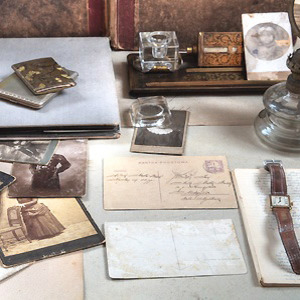How to trace your family tree
New online records and resources mean it's never been easier to find out more about your ancestors and what life was like for them. Not sure where to start? Take five minutes to read our beginners' guide... By Jane Murphy

The good news? You can now search online for details of your relatives' births, deaths, marriages, military records and professions without even getting up from the sofa. The bad news? There's so much information out there, the whole process can seem littered with confusion, contradictions and dead ends. So the best starting point is to step away from the internet - and go back to good old-fashioned talking and note-taking...
Ask the family
Speak to your relatives - particularly older ones - to find out all you can about your family's past. Your main aim is to uncover details of births, deaths and marriages, as these are the life events that are easiest to trace. But any information you can get on where and how they lived will be useful - not to mention interesting. Looking at old family photos and documents such as wills, diaries and letters will also provide clues and help jog people's memories. So be prepared to spend an afternoon or six rifling through the attic.
A few tips?
Don't go all 'Jeremy Paxman' on your relatives and turn a cosy chat into an interrogation. Allow the conversation to flow and memories will gradually come flooding back. But don't assume everything you're being told is the absolute truth. People don't normally have instant recall of something that happened - or a story they were told - decades ago.
What's more, all families have secrets - and some are bigger or better-kept than others. Things such as illegitimacy, affairs, adoptions, homosexuality, bigamy and crimes may all have been expertly covered up in the past for reasons that seemed important at the time, even if some of them are hard to fathom now. It's only when you progress further with your research that a clearer picture of what really happened may come to light.
Make a plan
Keep a note of everything you discover from your family and first-hand research, no matter how innocuous it may seem. These notes will form the basis of your detective work and you'll doubtless need to refer back to them throughout the entire process. Ready to progress? As tempting as it may be to plunge straight in and start investigating your heroic great-grandfather's war records, a methodical approach is best when compiling your family tree. The simplest strategy is to begin with yourself and then work backwards.
It can also help to concentrate on just one line of the family, at least initially. Many people opt for the father's line first, simply because it's far more straightforward to search for people with the same surname. It's also easier to search official records for relatives with unusual surnames. Be warned: it can take an age to wade through all the Smiths, Browns and Joneses. And remember that spellings may vary, particularly in older records.
Getting started online
It's very easy to become overwhelmed by the amount of official records that are available online - not to mention the various ways of accessing them. There are several excellent commercial websites, which we'll come to in a minute. But before you shell out for a subscription, it's definitely worth searching out as much as you can for free.
So let's start with the basics: births, deaths and marriages. Due to the 19th-century population explosion, civil registration for these events was introduced in England in Wales in 1837, in Scotland in 1855, and in Ireland in 1864. You can order full birth, adoption, marriage, civil partnership and death certificates from the General Register Office. The current cost is £9.25 per certificate - and it helps if you know the unique reference number.
You can check all the details - including that reference number - on the FreeBMD website. This is an ongoing project, the aim of which is to provide free access to these records. The transcribing is carried out by teams of volunteers and currently contains index information for the years 1837 to 1983.
Going further back - and abroad
But what about finding ancestors who lived prior to 1837? In the UK, the best resources are parish records and non-conformist registers - which list baptisms, marriages and burials. FreeBMD's sister website FreeREG is another wonderful ongoing voluntary project, which allows you to search through these records for free. You only need input a relative's surname and up to 10 counties in order to start looking.
Of course, many of us have relatives who came to this country from abroad or later emigrated. So what then? Immigration and emigration records are kept by the National Archive - and many are accessible online. You can find out all you need to know about immigration at www.nationalarchives.gov.uk/records/looking-for-person/immigrants. And for records of UK citizens who have emigrated, go to www.nationalarchives.gov.uk/records/looking-for-person/emigrants.
More great resources
As its name suggests, the National Archive also holds many more records that can help you trace your ancestors and find out about their lives. To discover what's available and where, go to www.nationalarchives.gov.uk/records/looking-for-person/default.
Census records for England and Wales from 1841 to 1911 are currently available online and are available through the National Archive's commercial partners, Findmypast.co.uk and Ancestry.co.uk. It's free to search the websites, but there is usually a charge to view full transcriptions and download documents. However, both of these websites currently offer free 14-day trials. Some of the information is also available at FreeCEN.
The census has taken place every 10 years since 1841 and provides a fascinating snapshot of where people lived, who they lived with and what they did for a living. The 1921 census and all later surviving censuses are kept by the Office for National Statistics - but the information only becomes available 100 years after they were conducted.
Commercial websites such as those mentioned above also hold a plethora of information such as tithe records, military records, newspaper cuttings and old photographs. The temptation to shell out for a subscription is huge - and doing so can be very rewarding. But you may also end up with a whole lot of irrelevant information, so do try to stay focused.
One final word: during your search, you will inevitably come up against challenges and dead ends. You may also uncover some information you'd prefer not to have known. But if you treat the project as an enriching history lesson and a way of finding out more about people and what makes them tick, you're unlikely to be disappointed.
You might also like...
Make a family tree picture
Get to know your family health tree
Your new technology etiquette guide










